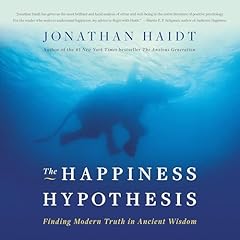
Nonzero
The Logic of Human Destiny
No se pudo agregar al carrito
Add to Cart failed.
Error al Agregar a Lista de Deseos.
Error al eliminar de la lista de deseos.
Error al añadir a tu biblioteca
Error al seguir el podcast
Error al dejar de seguir el podcast
 Exclusivo para miembros Prime: ¿Nuevo en Audible? Obtén 2 audiolibros gratis con tu prueba.
Exclusivo para miembros Prime: ¿Nuevo en Audible? Obtén 2 audiolibros gratis con tu prueba.Compra ahora por $24.28
-
Narrado por:
-
Kevin T. Collins
-
De:
-
Robert Wright
At the beginning of Nonzero, Robert Wright sets out to "define the arrow of the history of life, from the primordial soup to the World Wide Web." Twenty-two chapters later, after a sweeping and vivid narrative of the human past, he has succeeded and has mounted a powerful challenge to the conventional view that evolution and human history are aimless.
Ingeniously employing game theory the logic of "zero-sum" and "non-zero-sum" games, Wright isolates the impetus behind life's basic direction: the impetus that, via biological evolution, created complex, intelligent animals and then, via cultural evolution, pushed the human species toward deeper and vaster social complexity. In this view, the coming of today's interdependent global society was "in the cards" - not quite inevitable, perhaps, but, as Wright puts it, "so probable as to inspire wonder." So probable, indeed, as to invite speculation about higher purpose, especially in light of "the phase of history that seems to lie immediately ahead: a social, political, and even moral culmination of sorts."
In a work of vast erudition and pungent wit, Wright takes on some of the past century's most prominent thinkers, including Isaiah Berlin, Karl Popper, Stephen Jay Gould, and Richard Dawkins. He finds evidence for his position in unexpected corners, from native American hunter-gatherer societies and Polynesian chiefdoms to medieval Islamic commerce and precocious Chinese technology; from conflicts of interest among a cell's genes to discord at the World Trade Organization.
Wright argues that a coolly scientific appraisal of humanity's three-billion-year past can give new spiritual meaning to the present and even offer political guidance for the future. Nonzero will change the way people think about the human prospect.
©1999 Robert Wright (P)2010 Audible, Inc.Los oyentes también disfrutaron:




















Reseñas de la Crítica
Las personas que vieron esto también vieron:


















The two items needed for economic development, cheap transportation and effective communication, are facilitated by higher population density leading to more growth and technological developments hence an evolving of civilizations.
The book was originally copyrighted over 10 years ago (today is 2012). The book only lost my interest when he was topical and futuristic during about 2 hours of the second half. I was ready to give up and I'm glad I didn't. The book then got really interesting by tying together his major theme on the organization of organic processes. He got into the second law of thermodynamics, and how information and the processing of that information at its core is physical.
His real theme is that cultures evolve by constructive coordination (win-win situations) but he supports that by educating the listener through historical narratives, fine points on economic theory and the importance of information processing for growth.
I enjoyed this book so much I've downloaded his next book, "The Evolution of God".
Hard not to learn something by reading this book
Se ha producido un error. Vuelve a intentarlo dentro de unos minutos.
Idea is beautiful and worth ruminating.
Se ha producido un error. Vuelve a intentarlo dentro de unos minutos.
Wow
Se ha producido un error. Vuelve a intentarlo dentro de unos minutos.
Worth reading twice, twenty years apart
Se ha producido un error. Vuelve a intentarlo dentro de unos minutos.
That said, I found this book fascinating, eye-opening, and perspective-altering! Much of it has to do with long-term human history, viewed from the perspective of cultural evolution by way of "non-zero-sumness". It may make you look at history in a different light! I particularly liked his treatment of the so-called Dark Ages, and all the technological innovation that was actually taking place. A lot of people have complained about the last part of the book where he strays from strict factual interpretation to speculation and philosophy. But I think if you can get over yourself enough to listen with an open mind he has some interesting things to say in that section as well. For example there was a cool thought experiment that made me question my flippant dismissal of the "hard problem" and "mystery" of consciousness. Plus, even if you disagree with him, it's interesting to hear and think about. I do wish he'd write an update, as this was originally published in 2001. But it's still relevant, and an overall great book!
Game theory logic tackles cultural evolution
Se ha producido un error. Vuelve a intentarlo dentro de unos minutos.


